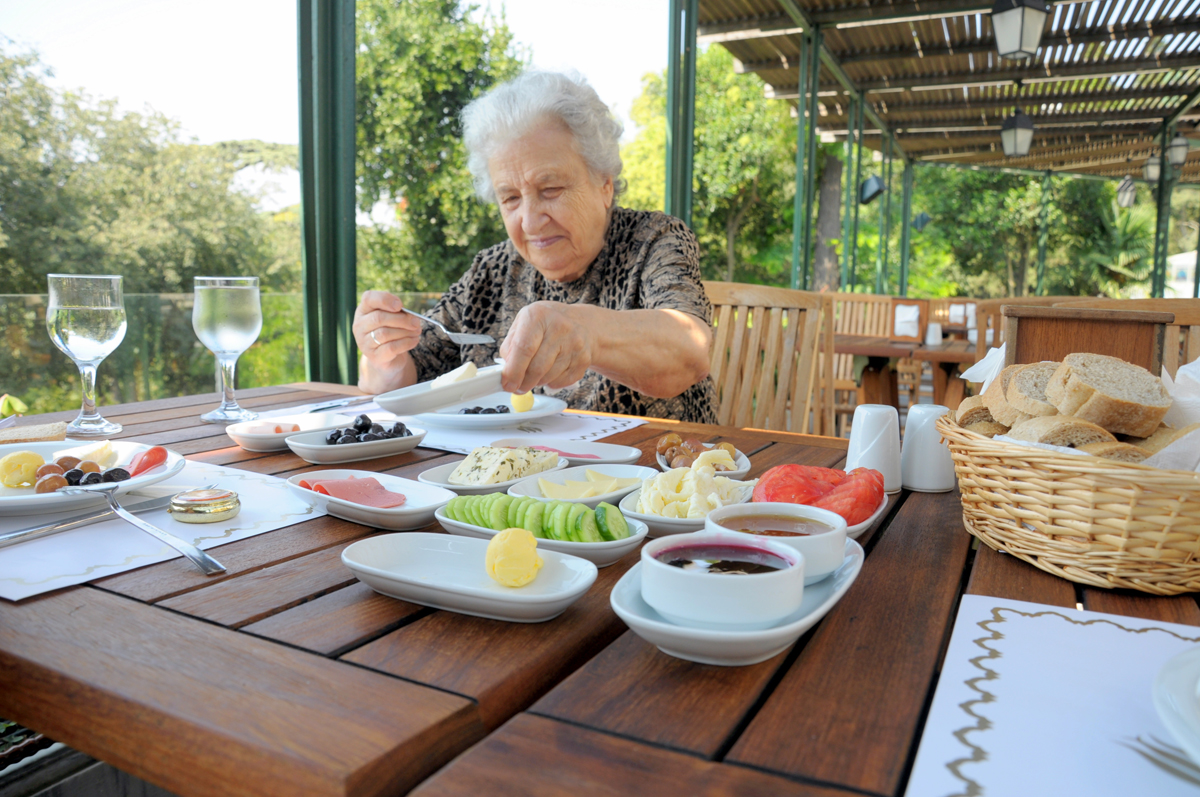“We believe dementia care needs to be transformed from a mindset of coping with loss to one of full engagement in life,” said Jackie Harris, President and CEO of EMA. EMA owns and operates three continuing care retirement communities in Maryland, plus Copper Ridge, which provides both outpatient and residential care for the memory impaired.
From a diet and nutrition standpoint, the traditional approach has also been to cope with loss: loss of appetite, loss of communication skills, loss of cognitive capabilities, loss of motor control, and loss of sensory processing. As a result, choices, activities, menus, flavor and even the social aspects of the dining experience are often eliminated or severely limited. EMA promises more and holds its strategic partners to a different standard. “As a partner in the transformation that Jackie and her team envisions, our focus has been to develop new ways to ensure that the dining experience is personalized and fully engaging for each resident living with dementia,” said Richard Schenkel, president and CEO of Unidine Corporation, EMA’s dining management partner.
Harris also serves as Chairperson of the Copper Ridge Institute Board. The Copper Ridge Institute is at the forefront of scientific research related to treatment and care of individuals with Alzheimer’s disease and other dementias.
“In most senior living and long-term care communities, the dining experience is a critical expression of the brand,” said Harris. “Yet, when it comes to memory care and dementia, that aspect is often set aside. Together, EMA and Unidine are proving that it doesn’t have to be that way.”
Harris’ vision and her team’s commitment to achieving quality care have resulted in a new model for dementia care called Copper Ridge Pathways which represents a fundamental shift in approach. Five Pathways address the needs, struggles and aspirations of not only the resident, but also those who care for and support them. These Pathways include:
- Pathway for the Resident: a path for each individual that is unique and honors each person’s personality, history, interests and personal preferences.
- Pathway for Engagement: a path that ensures each person is leading a life in which they are fully engaged, focusing on the strengths of the person and not on what they have lost.
- Pathway for the Environment: a path that creates a home and not a “home-like” experience for each person.
- Pathway for the Family and Caregivers: a path that provides education and support that recognizes their desire for meaningful living.
- Pathway for Colleagues: a path that supports the professional growth and development needs of staff and creates an environment that respects their needs.

To achieve the level of quality care that they have set as their goal, EMA challenges themselves as well as their partners to adopt a transformational mindset. For the dining program, this means adopting the same individualized approach that EMA uses to provide care to residents. Each individual’s preferences, clinical nutrition needs, interests, history and lifestyle are managed through Unidine’s recipe and menu management platform. From the resident’s perspective, their dining options represent an extension of who they are. Rather than “home-like,” their dining experience is authentic, familiar, and comfortable.
As individuals progress through later stages of dementia, different approaches are required to prevent the undernutrition and dehydration that are common in memory care populations. At EMA, hydration stations feature water infused with fresh fruits, herbs and vegetables in clear, easy-to-operate containers that stimulate interest and serve as a visual reminder to residents to stay hydrated. Favorite flavor combinations include Pomegranate & Orange or Pineapple & Sage. Enriched snacks, fortified foods and super smoothies made from fresh ingredients replace canned supplements, and engage residents with flavor and an appetizing presentation while meeting their nutritional requirements.
Cognitive difficulties and loss of motor control are particularly challenging, yet residents that are living with dementia can still be engaged in their dining experience. Visual menus have been developed so that residents who struggle to understand text or to communicate verbally, can choose their meals by simply pointing to the picture. Blue plates that clearly contrast with table color and the food that is placed on them can help the resident to recognize the food.
An extensive library of finger food recipes has been developed to deliver a wide variety of familiar flavors in forms that don’t require the motor and cognitive skills to manipulate utensils. Through this innovative program, Unidine has created finger food versions of favorite comfort foods, including Mini Beef Wellingtons, Salmon Summer Rolls and Potato Taco Bites. And for residents with dysphagia, purees are made from the same fresh ingredients used to make meals for all residents. Then, they are artfully reconstructed using advanced molding, layering and piping techniques, so the resident can dine safely with dignity and enjoy the same flavors and aromas as their peers. The growing number of menu selections includes a grilled chicken breast topped with a tangy balsamic glaze and served with saffron rice pilaf soufflé and steamed broccoli, or North Atlantic stuffed cod with a tangy dill sauce, steamed baby carrots and duchess potatoes baked to a golden brown.
Today, 5.4 million Americans are living with Alzheimer’s Disease. EMA’s Copper Ridge Pathways represent a transformational approach to fulfilling not only the needs of this growing population, but their desires and aspirations as well as those of their families and caregivers. EMA’s unique partnership with Unidine is representative of the opportunities for innovation and quality care that the Copper Ridge Pathways framework enables, and EMA and its partners continue to work towards that vision.

